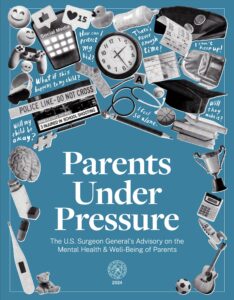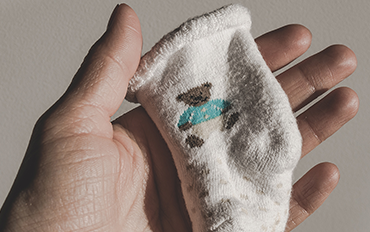Last year, U.S. Surgeon General Dr. Vivek Murthy released an advisory titled “Parents Under Pressure,” highlighting the escalating stress and mental health challenges faced by parents and caregivers. The report emphasizes that parental well-being is crucial not only for the health of parents but also for the optimal development of children and the overall health of society. The report cited that 33% of parents reported high stress levels, compared to 20% of adults without children. Additionally, 48% of parents felt their stress was overwhelming on most days.
Family stressors, whether internal or external, seem to be at an all-time high. Financial burdens associated with the rising costs of mortgage/rent, food, utilities, childcare, and prescription medications take a huge toll on parents. The relational impact of grief, school shootings, intimate partner violence, the use of technology/social media, single parenting, caregiving for seniors, parenting children with chronic illness, developmental delays, and mental illness amplify distress. Parents not only juggle work demands and their own wellbeing but also wrestle with worries about the mental health and safety of their children (Pew Research, 2023). Add healthcare disparities, global tensions and warfare, discrimination, systemic inequities, and oppression to the mix, and it feels impossible not to drop the ball (Durham, 2024). Just as the plumbing in our kitchen and bathroom can only handle so much, the world’s muck and debris leave our systems at risk of rupturing.
 Parental stress has made the list of public health concerns, according to the Surgeon General (Murthy, 2024). In fact, the General Advisory notes, “the well-being of parents and caregivers is a critical and underappreciated public health priority” (p. 21). With clogged pipes, a diagnostic assessment easily reveals the culprit. While some obstruction is inevitable due to temperature changes and corrosion due to age/time, major blockage is avoidable (spoiler alert: Use a strainer in the sink!) and amenable to repair.
Parental stress has made the list of public health concerns, according to the Surgeon General (Murthy, 2024). In fact, the General Advisory notes, “the well-being of parents and caregivers is a critical and underappreciated public health priority” (p. 21). With clogged pipes, a diagnostic assessment easily reveals the culprit. While some obstruction is inevitable due to temperature changes and corrosion due to age/time, major blockage is avoidable (spoiler alert: Use a strainer in the sink!) and amenable to repair.
Although it takes time and systemic efforts to ameliorate economic and societal barriers, what can parents do to stop their pipes from bursting? In the same way that certain variables reduce the risk of adverse childhood experiences (CDC, 2024), protective factors can minimize the impact of parental stress (APA, 2024). Consider how the following suggestions may help alleviate pressure:
- Social support – Whether talking to family or a trusted friend, openly discussing your concerns stops the unnecessary suffering of handling the weight of the world all alone. Being honest with yourself about the impact of stress serves as a springboard for collaborating as a family to build resilience. Community care and peer support offer wonderful opportunities to connect and share resources. And remember, call the plumber (or the therapist), if you need professional help! Licensed mental health professionals can further assist with strategies related to boundaries and time management, as well advocacy and overall coping skills.
- Wellness activities – Rather than prioritizing pop-culture’s commodified versions of self-care, consider how healthy habits help loosen things up and relieve stress. Start with the basics like staying hydrated, eating nutritious foods, and getting proper rest/sleep. In addition, schedule your annual medical appointments and get necessary check-ups to address ailments that sometimes go unnoticed. Being physically well reboots the system and has a ripple effect on mental, emotional, and relational wellbeing. Meditation, fitness, music, art, and nature can also further enhance wellbeing. Watch a movie together, take a group fitness class, go bowling, or play a board/card game. Take a poll and identify ways to have fun as a family!
- Mindfulness and Empathy – Just like knowingly putting non-flushable wipes in the toilet causes problems, some pressure is self-imposed. Recognizing stressors occur does not require awfulizing them. Being consumed by anger, anxiety, or despair adds fuel to the fire (or grease to the drain). This statement does not negate systemic factors beyond our immediate control, nor does it discount tragedies and trauma. Rather, it emphasizes the value of adopting a growth mindset and a compassionate stance. Perfectionistic tendencies also cause excessive pressure. Cut yourself some slack if you don’t finish the laundry, mow the lawn, coordinate outfits for a holiday photo, or fix that wobbly drawer! Newsflash: This also teaches your children that it’s not the end of the world if they don’t make straight As or have an undefeated season. Nurturing them is just as important (if not more) than focusing on excellence, structure, and discipline. Having realistic expectations of yourself and your family and giving yourself (and others) grace normalizes the wide range of emotions and consequences that come with the territory of facing life’s challenges.
In closing, when life leaves you feeling stuck as a parent, penetrate the pressures with these protective factors to find your flow.

Shatavia Alexander Thomas, DMFT, LMFT, is an AAMFT Professional member holding the Clinical Fellow and Approved Supervisor designations, a licensed marriage and family therapist (LMFT), and a National Certified Counselor (NCC). She has worked in the mental health field for 20 years and in higher education for 10 years. Trained in family systems, her strengths-based style involves offering hope, maximizing resources, infusing creativity, and exploring the impact of language, cultural factors, and relationships. Thomas also maintains a small private practice.
American Psychological Association. (2024, July 12). Parental burnout and stress. https://www.apa.org/topics/stress/parental-burnout.
Center for Disease Control. (2024, May 16). Adverse Childhood Experiences (ACEs). https://www.cdc.gov/aces/risk-factors/index.html.
Durham, A. (2024, September 3). What Black parents say on parenting. https://wordinblack.com/2024/09/what-black-parents-say-on-parenting/.
Murthy, V. (2024). Parents Under Pressure: The U.S. Surgeon General’s Advisory on the Mental Health & Well-Being of Parents. US Public Health Service. https://www.hhs.gov/sites/default/files/parents-under-pressure.pdf
Pew Research Center. (2023, January 24). Parenting in America Today [Report]. https://www.pewresearch.org/social-trends/2023/01/24/parenting-in-america-today/.
Other articles
Visiting Neglected Corners: Exploring Early Pregnancy Loss in the Workplace
In the U.S., the issue of reproductive health has been at the center of the political debate about women’s rights, particularly since the Supreme Court overturned Roe v. Wade in 2022, and more recently with the government’s administration change. Independently of political affiliation, MFTs are still tasked with supporting individuals and families navigating the effects of early pregnancy loss in the complex legal and political landscape of women’s reproductive care.
Danna Abraham, PhD, Ixchel Solorzano, MA & Mohammad Shahisaman, MA
Still Wrestling with Anxiety? Why Deep Breaths and Mindset Shifts Are Not Enough
Most people experience moments of anxiety—whether about politics, work, finances, health, or relationships. While occasional anxiety is a natural part of life, and even a helpful motivator sometimes, it becomes problematic when its intensity and frequency interfere with daily functioning—a presentation currently on the rise.
Marie-Nathalie Beaudoin, PhD
Helping Youth Struggling with Anxiety
Anxiety in youth can manifest in various ways: some may become tearful, others agitated, and still others might withdraw. Changes in youth’s typical behaviors often signal that they are preoccupied with something difficult to understand, overcome, or envision.
Marie-Nathalie Beaudoin, PhD



